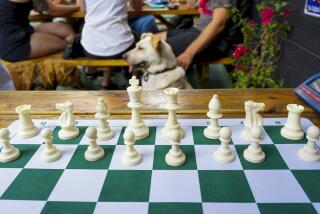Chess King Kasparov Beats Computer--Twice
- Share via
NEW YORK — It was a battle of two chess champions--one active and outspoken, known to sip tonic water during matches, the other sitting quietly on a desk, taking in a different kind of juice.
World chess champion Gary Kasparov, who has not lost a tournament since 1981, met Deep Thought, the winner of this year’s World Computer Chess Championship in Edmonton, Canada, for two games Sunday. The human won both games.
“I’m very happy I could do in both games what I wanted,” Kasparov said. “In the first game, with black, I played quietly. In the second game, I tried to crush it in the opening.”
The computer retired from the first game after Kasparov’s 52nd move and 2 1/2 hours of play. After that victory, Kasparov said: “I expected it. It’s a good player but without position and experience.”
Playing white in the second game, Kasparov took Deep Thought’s queen in move 18. The computer hung on, surrendering after 37 moves and two hours.
“I think the computer needs to be taught something--how to resign,” the 26-year-old Soviet said.
Kasparov said after the first game he realized early on that he would win when the computer missed some tactical opportunities and was not able to analyze all of the champion’s decisions.
“I don’t mind who’s sitting opposite me,” said Kasparov, who lives in the Soviet city of Baku, in Azerbaijan. “If a computer should win, of course, I would have to challenge it to protect the human race.”
Murray Campbell, who helped create the computer program at Carnegie Mellon University in Pittsburgh, Pa., said it appeared there was a bug in the computer.
“It wasn’t looking at the right moves,” he said. “It wasn’t given a chance to show its best style of play.”
Deep Thought, created by five graduate students at Carnegie Mellon, can analyze 700,000 possible positions on the chessboard per second and 5 to 20 moves ahead by each side, as well as discern each move’s implications.
Deep Thought evaluates the millions of possible board positions created by each sequence of five moves it imagines. It assigns a numerical value to the positions created by each sequence and moves toward positions with the highest values.
The computer remained in Pittsburgh with a telephone line to relay its moves to a computer terminal in New York.
Kasparov said the computer was “fully aggressive” but that its “mind was too straight and too primitive.”
“Chess is much wider than just calculations. It’s even wider than logic. You have to use fantasy, intuition and some kind of prediction,” Kasparov said.
But he said the computer does have some advantages: “We can lose hope. A computer can’t lose hope.”
Kasparov captured the world championship in 1985.
Here are the moves from the second game:
Kasparov-Deep Thought: 1 d4 d5 2 c4 dxc4 3 e4 Nc6 4 Nf3 Bg4 5 d5 Ne5 6 Nc3 c6 7 Bf4 Ng6 8 Be3 cxd5 9 exd5 Ne5 10 Qd4 Nxf3+ 11 gxf3 Bxf3 12 Bxc4 Qd6 13 Nb5 Qf6 14 Qc5 Qb6 15 Qa3 e6 16 Nc7 ch Qxc7 17 Bb5+ Qc6 18 Bxc6+ bxc6 19 Bc5 Bxc5 20 Qxf3 Bb4+ 21 Ke2 cxd5 22 Qg4 Be7 23 Rhc1 Kf8 24 Rc7 Bd6 25 Rb7 Nf6 26 Qa4 a5 27 Rc1 h6 28 Rc6 Ne8 29 b4 Bxh2 30 bxa5 Kg8 31 Qb4 Bd6 32 Rxd6 Nxd6 33 Rb8+ Rxb8 34 Qxb8+ Kh7 35 Qxd6 Rc8 36 a4 Rc4 37 Qd7, Computer resigns.
More to Read
Go beyond the scoreboard
Get the latest on L.A.'s teams in the daily Sports Report newsletter.
You may occasionally receive promotional content from the Los Angeles Times.









